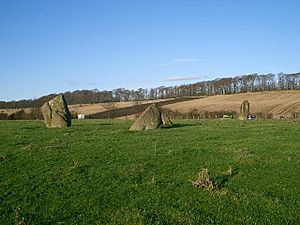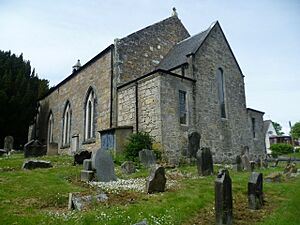Torryburn facts for kids
Quick facts for kids Torryburn |
|
|---|---|
 Tuilyies standing stones, beside the A985 road above Torryburn |
|
| Population | 1,030 (2020) |
| Council area | |
| Country | Scotland |
| Sovereign state | United Kingdom |
| Police | Fife |
| Fire | Fife |
| Ambulance | Scottish |
| EU Parliament | Scotland |
Torryburn, also known as Torry or Torrie, is a small village in Fife, Scotland. It is located on the northern coast of the Firth of Forth. Torryburn was once an important port for the nearby town of Dunfermline. The village sits in the Bay of Torry, in the southwest part of Fife.
In 2011, the area around Torryburn had about 1,587 people living there.
Contents
A Look Back in Time
Early Days of Torryburn
The village of Torry was first mentioned in records way back in 1296. This was in connection with its church, which was later rebuilt around 1800.
The Story of Lilias Adie
Lilias Adie is a well-known person from Fife's past, linked to the time when people believed in witchcraft. She passed away in prison in 1704. It is thought she was treated very harshly. She was buried on the shore of the village. Her grave is special because it is the only known burial place of someone accused of witchcraft in Scotland. Most others were burned. A large stone slab was placed over her grave. People believed this would stop the devil from reaching her.
In 1852, some of Adie's remains were dug up. Her skull was shown in different places for many years. It went missing in the mid-1900s. In 2017, old photos of her skull were used to create a 3D computer model. This model showed the face of an older woman with a kind expression.
Torryburn's Growth with Coal
Torryburn grew a lot in the 1800s because of coal mining. In 1778, an early coal pumping engine was started here. This engine was designed by the famous inventor James Watt.
Torryburn in the 1800s
According to a guide from 1862, Torryburn parish was about 5 miles long and 3 miles wide. It was bordered by the Firth of Forth and other areas like Saline and Dunfermline. There were small piers (docks) at Crombie and Torryburn. These piers were very important in the past. They served as the main port for Dunfermline.
Many people in Torryburn worked as weavers. They made special fabrics called damasks for Dunfermline. They also made cotton goods for Glasgow. The main church for the area was in Torryburn. There was also another church called the Free Church in Torry.
In 2013, the historic parish church was put up for sale.
Interesting Facts
Craigflower House
Craigflower Preparatory School was located at Craigflower House in Torryburn. This school operated from 1923 until it closed in 1979. Craigflower House is a very old and important building. It is protected as a "listed" building.
Torry Bay: A Special Place for Nature
Torry Bay is officially known as a Site of Special Scientific Interest (SSSI). This means it is a very important place for nature. The mudflats in the bay are a key habitat for many birds. Thousands of birds come to this area every year.
The shore might look empty, but it is full of life! One square metre of mud can hold up to 60,000 tiny snails or thousands of worms. These small creatures are vital food for the birds that spend the winter in Torry Bay.
In winter, you can see many different birds. These include great crested grebe, shelduck, wigeon, curlew, redshank, and dunlin. Other birds like sandwich tern, ringed plover, ruff, and greenshank visit during their autumn migration.
If you walk along the beach, you might find shells from cockles, mussels, periwinkles, and tellins. In the rockpools, you can often spot butterfish, gobies, sea anemones, shore crabs, and shrimps.
Small areas of saltmarsh have colorful flowers. These include sea aster, thrift, and scurvy grass. A special plant called eelgrass grows in the soft mud. It is an important food source for the wigeon birds.
Famous People from Torryburn
- Alison Cunningham: She was born here in 1822. She became the nurse for the famous writer Robert Louis Stevenson.
See also
 In Spanish: Torryburn para niños
In Spanish: Torryburn para niños
 | Dorothy Vaughan |
 | Charles Henry Turner |
 | Hildrus Poindexter |
 | Henry Cecil McBay |


